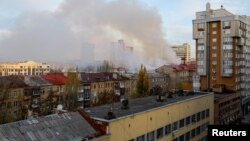Britain's Defense Ministry said Monday that Russia's loss of experienced air crew members during the invasion of Ukraine is contributing to Russia's "lack of air superiority is likely exacerbated by poor training," and "heightened risks of conducting close air support in dense air defense zones."
The U.K. said Russia's air capacity "is unlikely to change in the next few months," in an update posted on Twitter. "Russia's aircraft losses likely significantly outstrip their capacity to manufacture new airframes. The time required for the training of competent pilots further reduces Russia's ability to regenerate combat air capability."
In Kherson Sunday, residents were without lights and water, as the city's Russian-installed officials accused Ukraine of "sabotage," without evidence.
The Kremlin-backed officials said an attack organized by Ukraine, damaged "three concrete poles of high-voltage power lines."
The authorities said energy specialists were working to "quickly" resolve the issue, according to Agence France-Presse.
However, Yaroslav Yanushevych, the Ukrainian head of the Kherson regional administration, blamed Russia for the power outages.
Yanushevych wrote on Telegram: "In temporarily occupied Beryslav, Russian troops blew up high-voltage power lines. About one and a half kilometers of utility poles and lines were destroyed."
The "damage is quite extensive," he added, according to AFP.
Ukraine President Volodymyr Zelenskyy and other officials have said in the past month that between 30% and 40% of Ukraine's energy infrastructure has been destroyed by Russian airstrikes.
He said in his nightly video address Sunday, "As of this evening, stabilization blackouts continue in Kyiv and six regions. More than 4.5 million consumers are without electricity. Most of them are now in Kyiv and the Kyiv region. It's really difficult."
In Kyiv, Mayor Vitali Klitschko warned the city's residents Sunday that they must prepare for the worst this winter — such as having no electricity, water or heat in the freezing cold — if Russia keeps striking the country's energy infrastructure.
"We are doing everything to avoid this. But let's be frank, our enemies are doing everything for the city to be without heat, without electricity, without water supply, in general, so we all die. And the future of the country and the future of each of us depends on how prepared we are for different situations," Klitschko told state media.
The United Nations Climate Change Conference, more commonly referred to as COP27, opened in Egypt Sunday with the summit being overshadowed by Russia's war in Ukraine.
U.K. representative Alok Sharma, who was the president of COP26, said at the ceremonial opening speech at COP27: "(Russian President Vladimir) Putin's brutal and illegal war in Ukraine has precipitated multiple global crisis, energy and food insecurity, inflationary pressures and spiraling debt.
"These crises have compounded existing climate vulnerabilities and the scarring effects of the pandemic," Sharma added.
Sameh Shoukry, incoming COP27 president and Egyptian foreign minister, expressed concern Sunday that crises related to Russia's invasion of Ukraine should not overshadow action on climate change.
In Kherson, Russia is increasing its evacuation of residents from the conflict zone and acknowledging the deteriorating situation in the region. At least 70,000 civilians have been moved from Kherson, which fell to Russian forces within days of the start of the conflict in February.
While a bloody battle for the city is predicted, the "situation in Kherson is clear as mud," Michael Kofman, the director of Russian studies at CNA, a research institute in Arlington, Virginia, wrote in an analysis this week, The New York Times reported. "Russian forces seemed to withdraw from some parts, evacuated and drew down, but also reinforced with mobilized personnel."
Residents of the city report abandoned checkpoints and no more Russian patrols, but Ukrainian officials are cautious, believing Moscow is setting a trap.
Meanwhile, Zelenskyy said, in reference to the Iranian regime, that everyone who helps Russia prolong this war must bear responsibility for the consequences of this war.
"If it was not for the Iranian supply of weapons to the aggressor, we would be closer to peace now. And this means closer to a complete solution to the food crisis. Closer to solving the cost-of-living crisis. Closer to stabilization at the energy market. Closer to reliable security against radiation blackmail, which Russia does not give up," Zelenskyy said.
Iranian Foreign Minister Hossein Amir Abdollahian admitted for the first time Saturday that Iran sent drones to Russia, but he said that was before the war.
In his Sunday night video address, Zelenskyy dismissed Iran's admission of providing only a limited number of drones to Russia. He said Ukrainian forces are downing unmanned aerial vehicles daily.
The United States and its Western allies on the U.N. Security Council have called on Secretary-General Antonio Guterres to investigate whether Russia has used Iranian drones to attack civilians in Ukraine.
Some information for this report came from The Associated Press, Reuters and Agence France-Presse.









